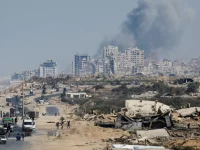Middle East. Is Israel using Sinai attack as wedge between Hamas, Egypt?

CLASHES. Palestinians in Gaza followed the bloody attacks in the Sinai Peninsula on July 1 with great concern.
When dozens of Islamic State (IS)-affiliated militants, known as Wilayat Sinai, attacked Egyptian military sites. Armed clashes between the two sides lasted several hours, and dozens were killed and wounded on both sides.
South of the Gaza Strip in Rafah, residents’ fears were voiced by Jihad al-Rai, who stressed that he and his fellow citizens fear that “these attacks would negatively affect the nascent improvement of the relationship between Hamas and Egypt and that the events in Sinai would extend to Gaza, since the residents of the Gaza Strip heard sounds of shells and gunfire exchanged between the Egyptian army and the militants on July 1.”
The bloody clashes in Sheikh Zuweid concerned not only the Egyptians. Rai and his neighbors felt that they were deeply involved, given the proximity of the attack sites to Gaza’s southern border, which lies at about 20 kilometers (12 miles) from Sheikh Zuweid.
On July 3, Mousa Abu Marzouk, a member of Hamas’ political bureau, condemned the Sinai attacks. Marzouk said the attacks adversely affect security in Gaza, because Sinai is the only access to the Gaza Strip from Egypt.
On July 2, Maj. Gen. Yoav Mordechai, the Israeli coordinator of government activities in the territories, accused Hamas of being involved in the Sinai attacks.
Sami Abu Zuhri, a spokesman for Hamas, told Al-Monitor, “Israel’s accusations are ridiculous and unacceptable. They aim to incite against Hamas and stir problems between it and Egypt. Hamas has taken explicit procedures to control the borders between Gaza and Egypt, prevent any smuggling and distance Gaza from any security developments. The movement [Hamas] is keen on Egypt’s security.”
On July 4, Abu Obeida, a spokesman for Izz ad-Din al-Qassam Brigades, Hamas’ armed wing, denied their involvement in the Sinai attacks. Abu Obeida confirmed that al-Qassam Brigades has no intention of implementing any foreign agenda through side confrontations. He told Al Jazeera the Israeli accusations were “lies and fabrication and an attempt to shuffle the cards and sow discord and chaos.”
Al-Monitor visited Gaza’s southern border with Sinai on July 4, where it noticed an intensive deployment of Palestinian security forces on the border with Egypt. During the tour, the sounds of Egyptian army shells and of clashes between its forces and militants inside Sinai could be heard.
Iyad al-Bazm, spokesperson for Gaza’s Interior Ministry, told Al-Monitor, “The ministry is reinforcing its troops along the southern border with Egypt in light of developments in Sinai to maintain the stability of the security situation and uphold border security.”
In an interview with Al-Monitor, the commander of Military Police, Col. Jihad Muheisen, said, “Intensive patrols are deployed along the border between the southern Gaza Strip and Egypt to protect and control the border following the Sinai operations. There are patrols along the border and troops deployed with the National Security Forces.”
Salah Bardawil, senior Hamas leader and member of parliament, denied June 9 the existence of any security cooperation between Egypt and the Gaza Strip, because Hamas “is not interested in exerting any efforts outside Gaza.”
However, an Egyptian security official who gave an anonymous statement to the Al-Resalah website expressed satisfaction with the security measures carried out by Hamas at the Gaza-Sinai border, describing the role that Hamas played after the Sinai attacks as positive, knowing that the common border over the past few days after the Sinai attacks has not experienced any infiltration of terrorist elements into and from Gaza, which demonstrates the effectiveness of the work the Hamas security apparatus is doing in monitoring and controlling the border.
Since the day of the attacks on July 1, the Rafah crossing has been closed, which directly affects Gaza. Currently at the writing of this article, there have been no Egyptian promises of the possibility of reopening this crossing in the near future, given the flared-up security situation in Sinai.
The city of Rafah has also been suffering since July 1 from a total power outage. The clashes between the Egyptian army and armed groups broke the electricity feeder lines in Sinai, which supplied Rafah with electricity.
Hamas’ concern regarding the Sinai attacks comes in light of steady improvement in its relationship with Egypt, represented by the intermittent but repeated opening of the Rafah crossing in June after a closure that lasted more than 100 days since early 2015, a decline in media campaigns launched between the two sides and several bilateral meetings during the past few weeks.
Mahmoud al-Zahar, a member of Hamas’ political bureau, said July 5 to Jordanian newspaper Al-Ghad that “Hamas is not happy with what is happening in Egypt, which is Gaza’s only gateway to the outside world. Hamas is very keen on maintaining Egypt’s security and stability and keeping it away from any conflicts.”
Egypt did not accuse Hamas of being involved in the Sinai attacks. An Egyptian official observing the developments of Egypt’s relationship with Hamas, who spoke on condition of anonymity, told Al-Monitor, “The recent Egyptian understandings with Hamas focused on Hamas’ commitment to control the southern Gaza border with Egypt to prevent militants from moving into and out of Sinai and prohibit the entry of banned goods — such as guns — through the underground tunnels stretching from Rafah in the southern Gaza Strip into the Egyptian territories.”
Ziad al-Zaza, former deputy prime minister and member of Hamas’ political bureau, told Al-Monitor, “Hamas interferes neither negatively nor positively in the internal affairs of any state, and Egypt is well aware of this fact. Hamas is only in confrontation with the Israeli enemy and not with any Arab party.”
Hamas seems to be relatively assured that the tensions with Egypt will not be renewed. Both sides seem to have agreed to turn the page. However, the recent attacks in Sinai do not guarantee Gaza won’t be implicated in future attacks. This is due to Hamas’ interests, which conflict with those of the parties concerned with security services in Sinai, be it Egypt, IS or Israel.
Perhaps the most conciliatory Egyptian stance in regard to Hamas was voiced by Maj. Gen. Mohamed Ibrahim, former Egyptian intelligence service agent, when he explicitly wrote in a July 6 article in Al-Ahram newspaper that the Gaza Strip does not interfere in security attacks in Sinai and was not a party to the fighting.
Hamas’ fears following the Sinai operations and their subsequent outcomes are related to the fact that the Gaza Strip seems to be implicated in a losing battle. Such a battle, if waged, would shift Hamas’ true inclination, which is confronting Israel. It would also lead Hamas to fights it has no interest engaging in, whether with the Egyptian state — whose control over Sinai is waning — or with the armed groups, which would reach the gates of Gaza from the southern border. This is a nightmare the Palestinians wish they never have to face.










